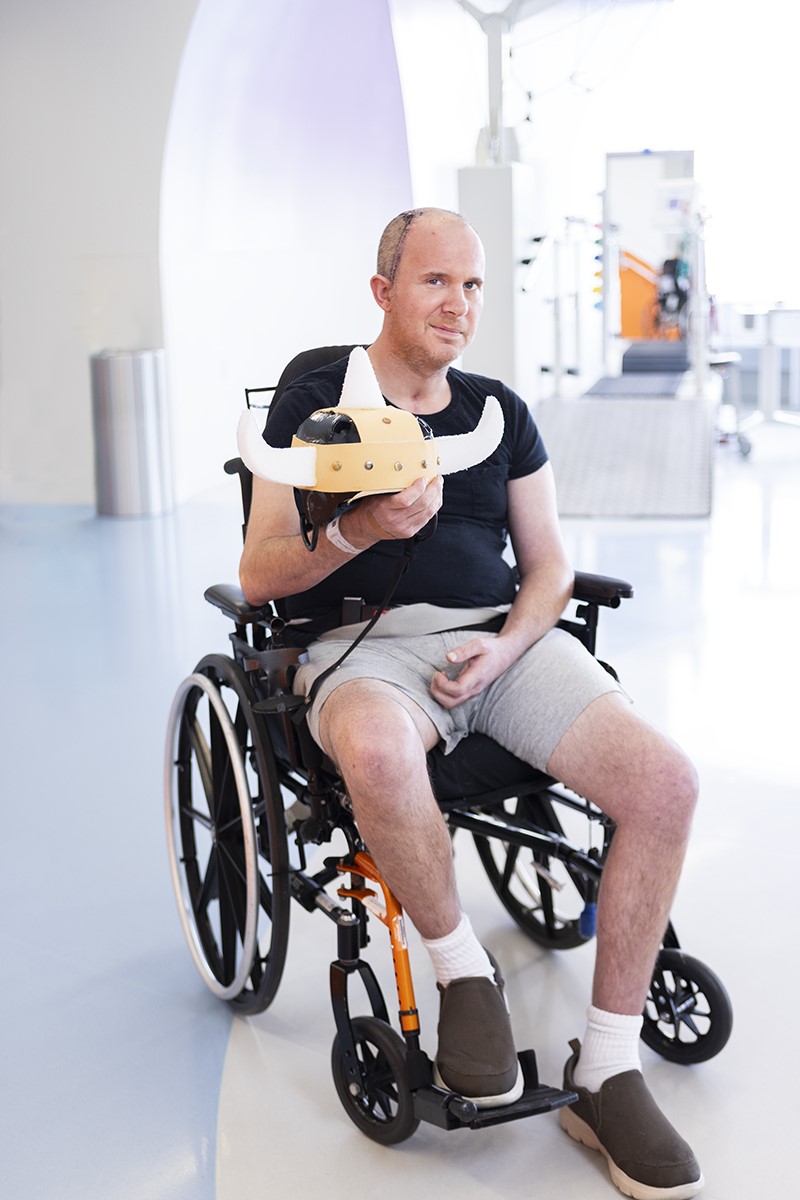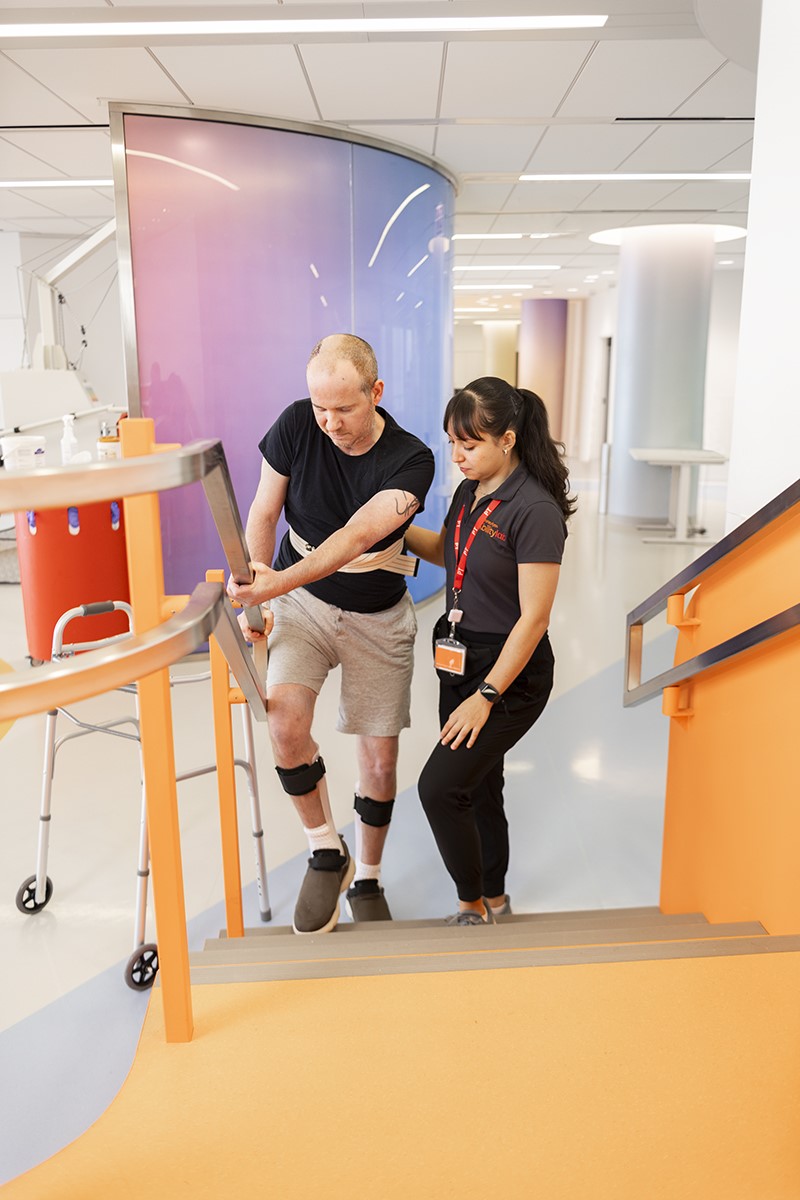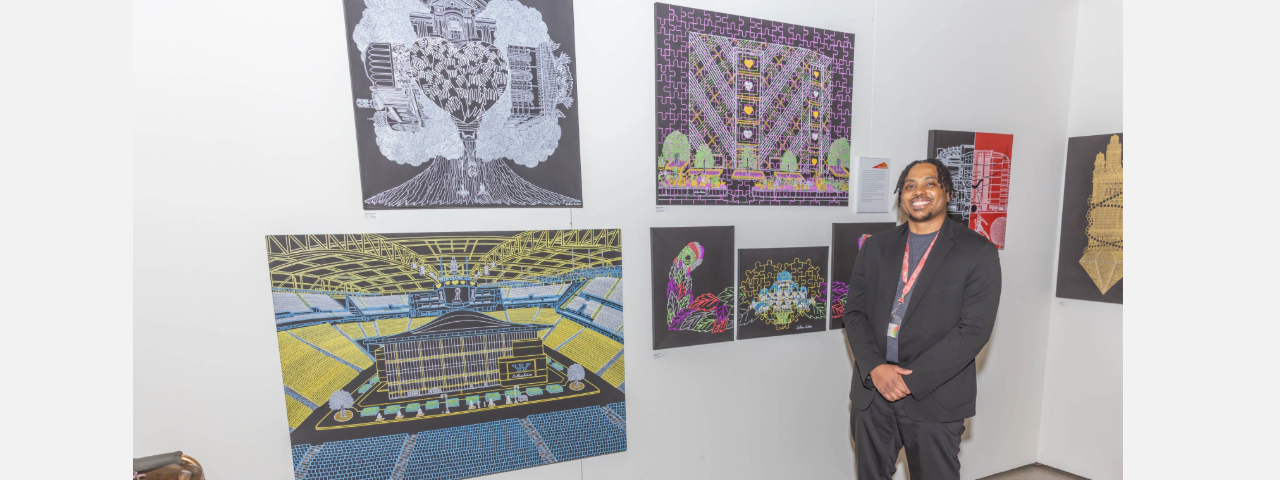Body
Niles, Mich., native Brandon, 39, was working in a new job. An electrical engineer by training, he was now a power engineer for a start-up that converts standard vehicles to run on electricity.
“The van we were working on was up on a car lift,” said Brandon. “I was standing on a stool underneath the car, reaching up and fell backward, hitting my head hard on the concrete floor.”
Brandon was rushed to an Elkhart, Ind., hospital, where he was diagnosed with a traumatic brain injury (TBI). He needed emergency surgery to remove part of his skull, a procedure called a craniectomy, which would relieve pressure on his brain until swelling decreased.
After a week in the acute-care hospital, Brandon was transferred to Shirley Ryan AbilityLab to begin therapy right away, a major factor in how much and how quickly he would recover. “We knew that Shirley Ryan AbilityLab was the best, so my family was ecstatic when I got in,” said Brandon.
Humor Makes Everything Better
Body
In the acute-care hospital, the initial craniectomy left his brain exposed and, thus, very vulnerable. To provide protection, Brandon was fitted with a helmet. In a fitting nod to his perseverance, he had Viking horns fashioned to adorn his helmet.
“It was a way to add my own individuality to a crummy situation and make people smile!” he said.
In his early days at Shirley Ryan AbilityLab, Nick, a prosthetist, happened to be walking by when he noticed Brandon wearing his Viking helmet. He approached Brandon and, pointing to it, said, “We gotta upgrade this thing!” When Nick brought it back, the horns were amplified, and braided leather straps completed the look. “When my therapists were looking for me, they just made a beeline for the Viking.”

Small Gains Were Huge Milestones
Body
Brandon’s top goal was to get back to his kids, son Ozni, 2, and daughter, Marceline, 7, whom he missed dearly. His wife, Tiffany, and the children were too far away for daily visits, but they were able to visit on the weekends.
Immediately after the accident, Brandon needed a tracheotomy to support breathing. As he got stronger, his acute-care team was able to remove it, which for Brandon was a major victory. “I was so happy when they got rid of the trach because I could finally communicate verbally again,” he said.
However, the insertion and removal of the trach had caused some injury to the voice box and his ability to swallow. “At first, my voice was ragged, and I could barely speak above a whisper, but my family tells me that I’m sounding more like myself every time they talk to me. My speech therapists really did a great job.”
Physical therapy was an equal challenge. Brandon needed to learn to walk again, including relearning to stand, take steps, balance and walk up and down stairs. “I’ve gotten 100 times better, by leaps and bounds,” he said. “Now, I can walk with and without a walker, and sometimes unassisted. Recently, I was able to walk to a coffee shop with my therapist. It was really liberating, so great to get outside, see other people … and get a coffee out of it.”

In occupational therapy, he worked on feeding and dressing himself, transferring into and out of a wheelchair, bed and shower chair, as well as on other activities of daily living. “My goal was always to get back to being able to take care of my family, to do everyday activities for my kids, like making their lunches, waking them up in the morning, getting them ready for school and daycare, going to the grocery store,” Brandon said. “In OT, I’ve used the kitchen a couple of times to make a grilled cheese sandwich. I feel safe doing it now.”
Rehabilitation of the Body, Mind & Spirit: The Soul Moves First
Body
Brandon says his journey was the hardest thing he’s ever gone through. He knew early on that he would need to draw upon his inner Viking. “There’s been a lot of pain and frustration, but you just have to keep fighting. What you put in, you get out, so I worked my tail off.” He also experienced pain in his feet for quite a while, and it wore on him. Relearning to bear weight, maintain balance and walk was very hard all by itself, but doing it on very painful feet made it even worse. After his doctor gave him a type of nerve medication, the pain eventually went away. Brandon points to the relief as another major victory.
Some days were harder than others, and that inner Viking saved the day on more than one occasion. He thought his wife would take it easy on him. Not so much. “She’d tell me, ‘Good, okay, now let’s kick it up,’” he said. “Sometimes a certain exercise really hurt, and my therapist would say, ‘Breathe through it,’ and I had to dig deep for that breath. They were right, though. Those were the times when I needed to remind myself that I just had to keep fighting, that the only way out was through — there were no free rides.”
Music Therapy Brings Unexpected Gifts
Body
Brandon spent five months at Shirley Ryan AbilityLab. That length of stay made it even more critical to treat the whole patient, expanding care from working on body and brain function, to supporting emotional well-being. One of his therapists asked if he’d like to try music therapy. Characteristically, Brandon was game. “We learned to play tone chimes, we created harmonies or played games like Simon Says or Horse,” he said. “It was nice to have a little fun and socialize with other patients. We all have something in common. We talked. It was a community.”
Getting Back to Being Dad: Keeper of Bees & Maker of The Great Grilled Cheese
Body
“My most important goal was always being able to get back home and take care of my kids,” he said. “It was reassuring when, during visits sometimes, my kids would get a little too energetic for a hospital, and I had to bust out my dad voice. That felt normal. Just Dad being Dad.”
He’s also eager to get back to his bees. A devoted beekeeper, Brandon looks forward to being strong enough to lift the 80-pound bee boxes, which are the physical structures for housing bee colonies. “To do hive inspections, you have to be able to lift that much weight,” he said.
Brandon has graduated to his next level of care, where he will continue therapy. He’s also thinking about the future and someday going back to work in his unique field.
“My team at Shirley Ryan AbilityLab was so good to me, truly compassionate and caring,” said Brandon. “I’m so grateful for their extraordinary expertise, and I will never forget how they helped me heal in ways I can't begin to convey. You can see how far I’ve come, and I couldn’t have done it alone. Now I feel that everything’s going to be okay, and one day I will return to say ‘thank you’ and ‘look at me now!’”

